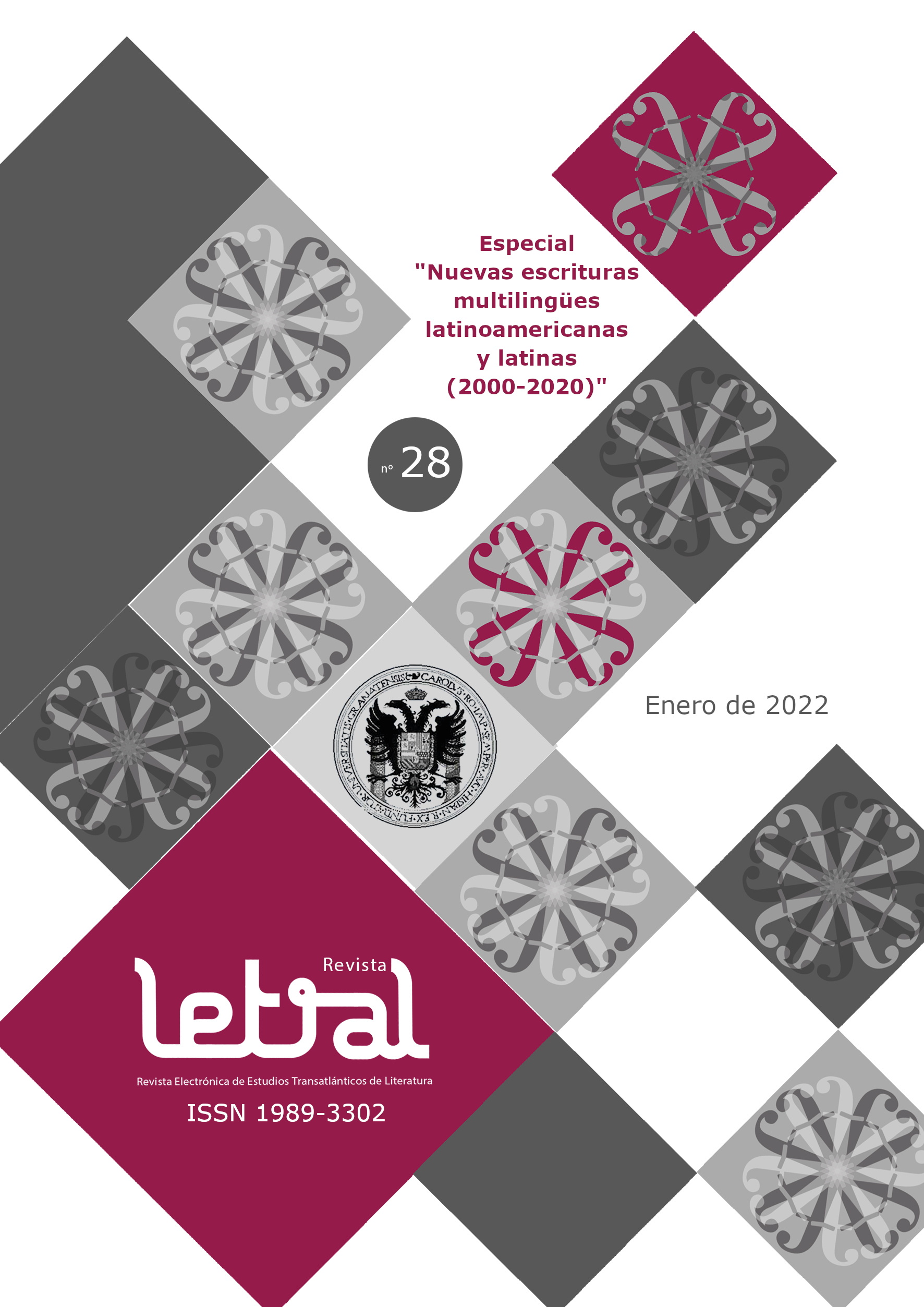How to Translate a “Wild Tongue”: A New Perspective on Gloria Anzaldúa’s Borderlands/La Frontera: The New Mestiza
DOI:
https://doi.org/10.30827/rl.vi28.21365Keywords:
Gloria Anzaldúa, multilinguism, translation, translation strategiesAbstract
Borderlands/La Frontera: The New Mestiza (1987) by Gloria Evangelina Anzaldúa, is a paradigmatic text when it comes to the representation of “mestiza” identities expressed through several tongues. The particular use of language in this book poses an interesting challenge in terms of translation. This article addresses the coexistence of languages for Spanish readers in three translations of the second chapter of Borderlands, entitled “Movimientos de rebeldía y las culturas que traicionan”. I focus on a comparative textual analysis of a collective translation of the chapter by Maria Serrano Gimenez, Rocio Macho Ronco, Hugo Romero Fernández Sancho and Álvaro Salcedo Rufo (2004), and the translations by Norma Elia Cantú (2015) and Carmen Valle (2016). The different approaches to the translation of multilingualism in these versions of Anzaldúa’s text are examined.
Downloads
References
Anzaldúa, Gloria. Borderlands/La Frontera: The New Mestiza. San Francisco, Aunt Lute Books, 1987.
Anzaldúa, Gloria. Borderlands/La Frontera: la nueva mestiza. Norma Elia Cantú (trad.). Mexico City, Programa Universitario de Estudios de Género, 2015.
Anzaldúa, Gloria. Borderlands/La Frontera: la nueva mestiza. Carmen Valle (trad.). Madrid, Capitán Swing, 2016.
Anzaldúa, Gloria. “How to Tame a Wild Tongue”. Liliana Valenzuela (trad.). Voces sin fronteras: Antología Vintage Español de literatura mexicana y chicana contemporánea, Cristina García (ed.), Nueva York, Vintage, 2009, pp. 31-46.
Anzaldúa, Gloria. “Movimientos de rebeldía y las culturas que traicionan”. Bell hooks. Avtar Brah, Chela Sandoval et al. Otras inapropiables: Feminismos desde las fronteras, Rocio Macho Ronco et al (trad.), Madrid, Traficantes de Sueños, 2004.
Anzaldúa, Gloria E. “(Un)natural bridges, (Un)safe spaces”. This bridge We Call Home: Radical Visions for Transformation, Anzaldúa, Gloria E & AnaLouise Keating (eds.), Nueva York, Routledge, 2002, pp. 1-5.
Bradford, Lisa Rose. “Approaching Oxen Rage”. Oxen Rage. California, Coimpress, 2015.
Butler, Judith. Undoing Gender. Nueva York, Routledge, 2004.
Cantú, Norma Elia. “Traducir: abrir caminos, construir puentes”. Borderlands/La Frontera: la nueva mestiza., Norma Elia Cantú (trad.), Mexico City, Programa Universitario de Estudios de Género, 2015, pp. 45-57.
Garber, Linda. Identity Poetics: Race, Class, and the Lesbian-Feminist Roots of Queer Theory. Nueva York, Columbia UP, 2001.
Grutman, Rainier. “Refraction and Recognition: Literary Multilingualism in Translation”. Target, n.° 2, 18, 2006, pp. 17-47.
Hansen Esplin, Marlene. “Self-translation and Accommodation: Strategies of Multilingualism in Gloria Anzaldúa’s Borderlands/La Frontera: The New Mestiza and Margarita Cota-Cárdenas’s Puppet”. MELUS: Multi-Ethnic Literature of the U.S., n.° 2, 41, 2016, pp. 176-201.
Joysmith, Claire. Nepantla: liminalidad y transición: Escritura chicana de mujeres. Mexico City, UNAM, 2015.
Keating, Ana Louise. The Gloria Anzaldúa Reader. Durham, Duke University Press, 2009.
Keating, AnaLouise & Gloria González-López. Bridging: How Gloria Anzaldúa's Life and Work Transformed Our Own. Austin, University of Texas Press, 2011.
Kellman, Steven G. The Translingual Imagination. Lincoln, University of Nebraska Press, 2000.
Meylaerts, Reine. “Heterolingualism in/and Translation: How Legitimate are the Other and his/her Language?”. Target, n.°1, 18, 2006, pp. 1-16.
Mignolo, Walter. Local Histories/ Global Designs. New Jersey, Princeton University Press, 2000.
Reynolds, Matthew (ed.). Prismatic Translation. Cambridge, Legenda, 2020.
Spoturno, María Laura. “La conquista del espacio enunciativo. Un estudio de las notas en la traducción al español de Borderlands/La Frontera”. Lengua y Habla, n.° 23, 2019, pp. 360- 379.
Spoturno, María Laura. “On Borderlands and translation: The Spanish versions of Gloria Anzaldúa’s seminal work”. The Routledge Handbook of Translation, Feminism and Gender, Luise von Flotow and Hala Kamal (eds.), Oxon, Routledge, 2020, pp. 239-251.
Valle Simón, Carmen. “Traducir Borderlands/La Frontera”. Borderlands/La Frontera: la nueva mestiza, Gloria Anzaldúa, Madrid, Capitán Swing, 2016, pp. 29-31.
Yildiz, Yasemin. Beyond the Mother Tongue: The Postmonolingual Condition. Nueva York, Fordham University Press, 2012.
Downloads
Published
How to Cite
Issue
Section
License
Revista Letral is an open access journal under a Creative Commons Atribución-NoComercial 4.0 license.
The works published in this journal may be reused, distributed and publicly presented for non-commercial purposes, provided that: cite the authorship and the original source of the publication (journal, publisher and URL of the work).
We strongly recommended you to share our published articles in social and scientific networks, institutional and public repositories, personal or institutional websites, blogs, Google Scholar, ORCID, ResearchID, ScopusID, etc.
The journal allow the author(s) to hold the copyright and to retain publishing rights without restrictions.
We are completely free, both for readers and authors.














